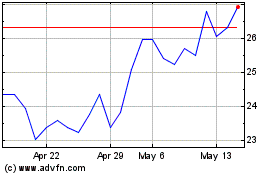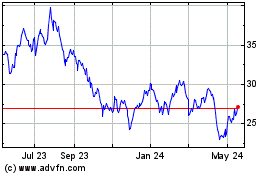Deadly Coronavirus Forces China's Gambling Hub to Shut Its Casinos
04 February 2020 - 11:10PM
Dow Jones News
By Jing Yang and Frances Yoon
The world's richest gambling market has closed its casinos to
help curb the spread of the deadly coronavirus that has killed
hundreds in China.
Macau said it would close casinos for 15 days starting
Wednesday, Chief Executive Ho Iat-seng said Tuesday. The
semiautonomous Chinese city is home to properties run by Wynn
Resorts Ltd. and Sheldon Adelson's Las Vegas Sands Corp., among
others.
Gambling and entertainment is the lifeblood of the former
Portuguese colony and Macau's gaming tables are rarely without
players. The city closed its casinos for 33 hours due to a powerful
typhoon in September 2018.
"It's a very difficult decision, but one we have to make for the
sake of the health of Macau citizens," Mr. Ho said at a news
conference. The recently appointed chief executive said he would
meet with casino operators later Tuesday to discuss details.
A total of 41 gambling and entertainment venues would be shut,
including casinos, bars, theaters and clubs, Secretary for Economy
and Finance Lei Wai Nong said at a second news conference.
The government will also pare back public services to meet only
essential and emergency needs; it urged citizens to stay inside
unless absolutely necessary.
Macau has recorded 10 cases of people infected with the viral
pneumonia. The two most recent cases were people who work for
casino groups. As of midnight Monday, mainland China had 20,438
cases, with 425 deaths, according to the National Health
Commission.
Shares in the casino giants' Hong Kong-listed units have fallen
sharply since mid-January and some of the declines came after Mr.
Ho first said a shutdown may become necessary.
On Tuesday, they dropped further, taking the year-to-date
declines for MGM China Holdings Ltd. and Wynn Macau Ltd. to 16% and
14% respectively, according to data from Refinitiv. Sands China
Ltd., which is part-owned by Las Vegas Sands, has fallen 11%.
Sands China's Venetian Macao closed its casino immediately after
Mr. Ho's announcement, a receptionist at the hotel said. The person
said the resort will comply with official guidelines and didn't
give a specific date for reopening the casino.
A person handling reservations at the Venetian said the hotel
would remain open but some restaurants would close entirely for the
next two weeks, and the hotel's shops would close earlier than
usual. A Wynn Macau reservations employee said it would close the
casino and poker room and suspend the hotel buffet.
Sands China and MGM didn't reply to emails requesting
comment.
Macau is the industry's heavyweight city, generating more than
five times the revenue that Las Vegas did in 2018. But revenue fell
in each of the last three months of 2019 compared with the
year-earlier period, according to Macau's Gaming Inspection and
Coordination Bureau.
In January Macau's gross gaming revenues dropped 11.3%
year-over-year to 22.1 billion patacas ($2.76 billion), a decline
fueled partly by a collapse in visitors during the Lunar New Year
holiday, which this year began on Jan. 25.
The number of mainland Chinese tourists plunged more than 80%
during the weeklong holiday, while Macau's overall visitor tally
dropped 78%.
Gross gaming revenue could decline 65% year-over-year in
February if Macau's casinos close for two weeks, Jefferies analysts
Andrew Lee and Lois Zhou wrote in a note on Tuesday.
Still, the casino operators can weather the suspension provided
that it is temporary, said Angela Han Lee, an analyst at China
Renaissance Securities (Hong Kong) Ltd. Ms. Han Lee said most of
their costs were variable and so wouldn't be incurred during a
suspension, meaning they could report positive earnings before
interest, tax, depreciation and amortization even if gaming revenue
drops 60%.
Paul Tse, chairman of the American Chamber of Commerce in Macau,
said the casino closures would encourage gaming companies "to not
get their employees coming to work from Zhuhai." Many staff live in
nearby Zhuhai, across the border in mainland China.
"The government's intention is quite clear: reduce the number of
people transiting from the various border checkpoints," Mr. Tse
said.
Joyu Wang contributed to this article.
Write to Jing Yang at Jing.Yang@wsj.com and Frances Yoon at
frances.yoon@wsj.com
(END) Dow Jones Newswires
February 04, 2020 06:55 ET (11:55 GMT)
Copyright (c) 2020 Dow Jones & Company, Inc.
Sands China (PK) (USOTC:SCHYY)
Historical Stock Chart
From Feb 2025 to Mar 2025

Sands China (PK) (USOTC:SCHYY)
Historical Stock Chart
From Mar 2024 to Mar 2025
